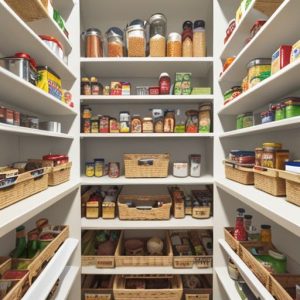 As a homemakers, we understand the importance of budgeting and making the most out of our resources. One area where you can significantly save money is on groceries. It’s no secret that the cost of food continues to rise, but with a few simple strategies, you can stretch your dollar further and keep your grocery bill under control (as much as possible). Here are some tips to help you save money on groceries.
As a homemakers, we understand the importance of budgeting and making the most out of our resources. One area where you can significantly save money is on groceries. It’s no secret that the cost of food continues to rise, but with a few simple strategies, you can stretch your dollar further and keep your grocery bill under control (as much as possible). Here are some tips to help you save money on groceries.
- Plan Your Meals & Create a Shopping List – One of the most effective ways to save money on groceries is by planning your meals in advance. By knowing exactly what you need for the week, you can avoid impulse buying and reduce food waste. Take inventory of what you already have in your pantry, fridge, and freezer, and then create a meal plan around those items.
Once you have your meal plan, create a shopping list that includes all the necessary ingredients for each meal. Stick to your list when shopping, and resist the urge to buy anything that’s not on it. This will help you stay focused and avoid overspending on items you don’t need.
- Buy in Bulk & Use Coupons – Buying in bulk can be a great way to save money on groceries, especially for items that you use frequently or that have a long shelf life. Look for bulk bins at your local grocery store or join a bulk buying club to take advantage of bulk pricing.
Coupons can also help you save money on groceries. Many stores offer digital or printed coupons that can be used to reduce the cost of your purchase. You can find coupons in your local newspaper, online, or even through store loyalty programs.
- Shop for Produce in Season – Produce that is in season is typically less expensive than out-of-season produce. This is because it’s easier for farmers to grow and harvest when the climate is favorable. To save money on groceries, try to buy fruits and vegetables that are in season. You can also consider preserving or canning in-season produce for use throughout the year.
- Choose Generic Brands – Generic or store-brand products are often just as good as their name-brand counterparts but cost significantly less. Give generic brands a try and see if you notice a difference in quality. You may be surprised to find that you prefer the taste and price of the generic alternative.
- Cook from Scratch – Cooking from scratch can save you money on groceries, as it allows you to control the ingredients and avoid purchasing pre-packaged or processed foods. Homemade meals not only tend to be healthier but are often more economical than buying pre-made or takeout options.
- Buy Frozen or Canned Produce – Frozen and canned fruits and vegetables can be a more budget-friendly option than fresh produce, especially if the produce you need is not in season. These products are often just as nutritious as fresh produce and can be a great way to save money on groceries.
- Avoid Pre-Packaged Snacks & Processed Foods – Pre-packaged snacks and processed foods can be convenient, but they are often more expensive and less healthy than homemade alternatives. Instead of reaching for pre-packaged snacks, try making your own granola bars, energy bites, or trail mix. You can also opt for whole foods like fruits, vegetables, and nuts for healthier and more budget-friendly snacking options.
By implementing these strategies, you can save money on groceries and stretch your budget further. Remember, planning ahead, buying in bulk, and shopping for produce in season can make a significant difference in your grocery bill. With a bit of effort and creativity, you can enjoy delicious, healthy meals without breaking the bank.












Be First to Comment